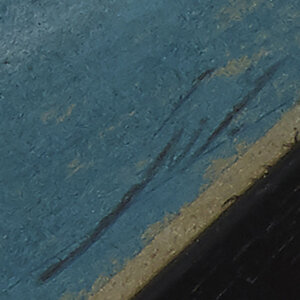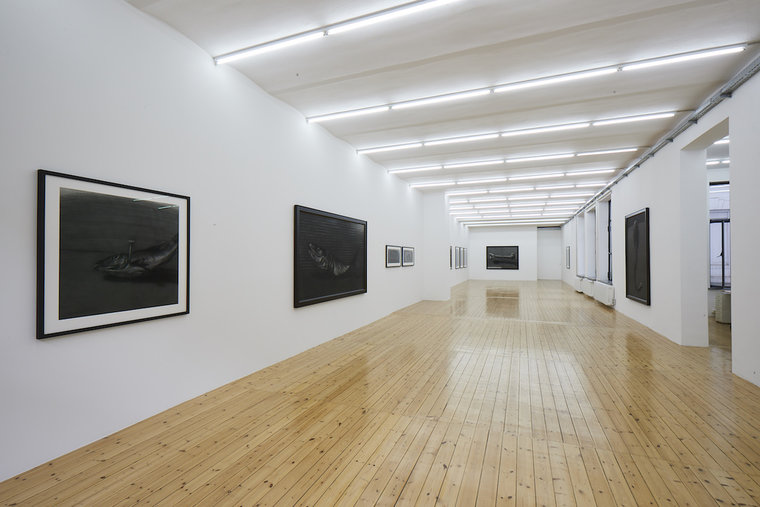


Last updated on Thu 6 September, 2018


Schwarz
Youssef Abdelké
September 6 - October 28 2018
We are proud to announce Youssef Abdelké’s solo exhibition in our Hamburg space. This show marks the debut of his collaboration with Galerie Sfeir-Semler.
Born in Qamischli, Syria in 1951, Youssef Abdelké has been engaged in politics and human rights activism throughout his life. In 1976 he produced a large-scale work on Black September - portraying the massacres of Palestinians in Jordan in 1970, which revealed a militant artist who, ever since, has been relentlessly denouncing violence, fighting for freedom of thoughts and human rights.
Abdelké was arrested for nearly two years in 1978, and then moved to France. Unable to return home, he lived and worked in Paris for twenty-four years. In 2005, despite the risks involved, he decided to travel back to Damascus, and was allowed through border security; but in 2010 his passport was confiscated by the authorities, who held him prisoner in his own country. He was arrested again for five weeks in 2013.
Speaking about his activism, Youssef Abdelké says: “I still believe today in progress and freedom of societies, I believe in the value of human life, and the respect of human rights. No one should ever be imprisoned for their opinions. An opinion should be faced with ideas, and not responded to with imprisonment”.
His time in prison and in exile deeply affected his practice, leading him to focus on drawing and etching. Using tools that scrape the surface of paper, he produces sharp compositions that convey a lucid and rational approach to life; transposing on paper what human bodies endure under dictatorships or in times of war.
He largely focuses on still-life, revisiting a genre that is traditionally associated with ornamental arts, and valued for its esthetic qualities, in order to highlight the violence that governs humanity. His drawings systematically depict delicate beings, or objects linked to his practice as an artist, that are faced with harsh and cruel elements: a paintbrush is depicted with a dead fly besides it, a fish is nailed to its background and a bunch of lilies is threatened by pins. His still-lifes acutely express incomprehension and indignation in reaction to loss and death. His subjects also include portraits of prisoners’ families, or severed human or animal limbs, proposing a more direct reference to Syria’s recent political history.
The artist exclusively produces work in black and white, and, despite the stillness of his drawings, they overflow with rage at injustice and abuse of power. His personal approach to perspective and his exploration of lines through drawing and etching reveal a multi-layered practice, that highlights the fragility of men and unexpectedly celebrates human life.
_____________________________________________________________________________________________________________________________________________________________________________________
In schwarz-weiß gehaltene Stillleben beherrschen den Ausstellungsraum. Auf den ersten Blick zurückhaltende, intime , teils filigrane Motive werden in den Zeichnungen mit toten Fliegen konterkariert, von Nägeln bedroht, manche gefesselt oder von Reizbrettstiften umrandet. Es sind die Momente der Gewalt in der Komposition dieser Bilder, die sie dem Genre entziehen und das Gefühl von Entrüstung, Gewalt und Bedrohung auslösen. Nicht nur Gegenstände, auch abgetrennte menschliche oder tierische Gliedmaßen sind zu sehen. Einige Portraits von Familien lassen tragische Schicksale erahnen.
Der 1951 in Qamischli, Syrien geborene Künstler Youssef Abdelké kritisiert die jüngere politische Geschichte seines Landes, die Ungerechtigkeit, und kämpft für die Rechte der Menschen hier. 1976 schuf er das großformatige Werk zum “Schwarzen September”, welches das an Palästinensern verübte Massaker in Jordanien im Jahr 1970 thematisiert. Es war der Anfang seines künstlerischen Weges im Kampf gegen die Gewalt und für die Freiheit. Für seine politische Überzeugung wurde Abdelké das erste Mal 1978 inhaftiert. Danach verließ er sein Heimatland und emigrierte nach Frankreich. In Paris verbrachte er 24 Jahre im Exil. Trotz aller Risiken kehrte er 2005 nach Damaskus zurück. 2010 wurde sein Pass von den Behörden eingezogen. Er blieb eingesperrt im eigenen Land bis er 2013 erneut für 5 Wochen inhaftiert wurde. Youssef Abdelké ist seinen Idealen bis heute treu: “I still believe today in progress and freedom of societies, I believe in the value of human life, and the respect of human rights. No one should ever be imprisoned for their opinions. An opinion should be faced with ideas, and not responded to with imprisonment”.
Gefangenschaft und Exil haben Abdelkés Arbeit stark beeinflusst: Die Fokussierung auf Zeichnung und Radierung als ausschließliches Ausdruckmittel ermöglichen klare und rationale Kompositionen. Während der formale Umgang mit Perspektive und Linie eine vielschichtige Auseinandersetzung mit Kunsttraditionen enthüllt und eine eigene Ästhetik etabliert, spiegeln die Inhalte das Lebensgefühl des Künstlers wieder. So schafft es Abdelké durch Klarheit seiner Komposition und Stille seiner Motive die Wut über Ungerechtigkeit und Machtmissbrauch abzubilden und die Zerbrechlichkeit eines menschlichen Lebens hervorzuheben.
Die Ausstellung, die bis 28. Oktober zu sehen ist, markiert den Anfang der Zusammenarbeit zwischen dem Künstler und der Galerie Sfeir-Semler. Die Werke der letzten Dekade zeugen von einer einmaligen künstlerischen Position in der syrischen Kunst der Gegenwart.
Join us in our endless discovery of modern and contemporary Arab art